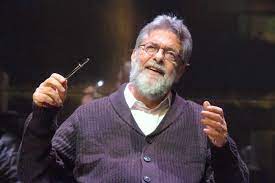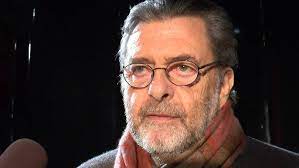
Andrea Giordana Malattia – Meet Andrea Giordana, film, TV, and theater actor who plays Alfio, a father from Catania, Sicily under fascist domination, grappling with his son Antonio, played by his real son Luchino, in the upcoming theatrical show Il bell’Antonio, based on the novel by Vitaliano Brancati, opening at the Manzoni theater in Milan on 9 January 2014.
An occasion for father and son to compete against one another, on the 60th anniversary of Brancati’s death, in challenging roles written by a writer frequently viewed as unsettling and countercultural.
Antonia Brancati, daughter of the author and of the recently deceased actress, Anna Proclemer, adapted the novel for the stage with the help of the Sicilian actress Simona Celi, keeping the novel’s original setting intact. The novel is also well-known for the 1960 film adaptation by Mauro Bolognini with Marcello Mastroianni.
The two-voice conversation reveals that Andrea and Luchino are not working together for the first time; they previously appeared in Othello under the direction of Giancarlo Sepe and The Lion in Winter with Rossella Falk. They now find themselves on stage in order to attribute greater complicity and truthfulness to their respective parts.
According to Luchino’s story, “looking a person in the eye and saying ‘dad’ when he is your real father helps you immerse yourself in the role.” Although I normally reside with my wife, I am grateful for the opportunity to continue living with my father during this time because the theater is a voyage of life and the tour requires you to be with other people.
Plus, unlike many performers who treat their artistic offspring like their own children, he actually listens to me when I talk. The two of us are emotionally generous, and we like to portray characters who are not cold but who express feelings typical of the human condition,» Andrea continues. «My son Luchino and I define ourselves as actors of the heart. Today in Italy, when one is sensitive it seems that one is wrong because our society requires that emotions must be frozen.
with Antonio, even though it’s not up to me to say, is doing a fantastic job. While I do think that talking to one’s kids is important, the show’s central theme is the lack of communication between a father and son in a culture like Sicily’s, where young boys are expected to conform to the stereotype of the conqueror and no one pays attention to the boy’s emotional concerns.
In the second act, Antonio confides in no one else but his uncle, and it is to him that he reveals a degree of vulnerability that was unheard of among Sicilian men at the time.Luchino continues, saying that the poem is not voyeuristic or scatological because Antonio’s alleged impotence is not physical but symbolic; it is an inability to love.
caused by an innate abhorrence of his environment’s backwards culture. Even the other characters in the novel are all losers and deeply undermined by the oppression of society’s conventions from which they cannot free themselves; Antonio, however, is uninterested in politics and revolutions; instead, he lives the anxieties in his intimate and, as a form of protest, he abstains from love.
The novel Il bell’Antonio, according to Andrea, is the second most widely read in Europe after The Leopard because it is “rich, full of nuances and irony, retains the scent of Sicily during fascism, also showing a fresco of the history of the time,” and “the characters are well-rounded with their own inner parable to tell, they are roles contrasting that offer many arrows to the actor.”
But what did his father think when Luchino wanted to become an actor and enroll at the Stabile di Genova? Dato che a volte aspetta che il telefono squilli e non succede, mio padre mi ha detto che non consiglierebbe il lavoro al suo peggior nemico.
who was also an actor but who told my dad “the real job of this job is to look for work”However, my parents encouraged me to pursue my passion: my father instilled in me the value of hard work, the importance of being accessible, and the joy of incremental success; a psychoanalyst, showed me how to analyze characters from all angles.
Andrea Giordana, once the star of numerous movies and TV shows, has shifted his focus to the stage but continues to keep a keen eye on the medium: There is a serious fault in cinema: it rarely goes beyond the limits of provincialism.
despite the fact that it is partly the State’s fault for not funding it and therefore making it too obviously commercial. TV shows run the risk of becoming widely popular even if they don’t live up to viewers’ expectations because of the public’s cultural apathy.
similar to the times when unusual simplifications were recommended in my screenplay adaptation of The Count of Monte Cristo. I wish today’s literature, even if adapted from original screenplays rather than merely novels as was done in the past, contained material that may enlighten and enrich its audience’s cultural understanding.
There’s no reason for Luke Wardhe to use Latin phrases. Aleardo, forbade it. They would have picked up some hesitant Italian skills. So it was, and they became the academic leaders of Ostia. Hugh Grant, James Bond, and the Gladiator all had their voices dubbed by Luca Ward.
shares how his father’s reading prohibition inspired him to become a voracious reader. Even yet, there is a hint of a Romanesque accent in his otherwise flawless Italian. «Kill». “Aoh.” Few words, few abbreviations and inflections, especially awkward when things heat up.
The actor, who has risen to prominence over the years, has firm convictions that stem from a deep well of civil and social zeal that appears to have ancient origins. The talent of being nobody is a one-of-a-kind autobiography that will be available on book shelves on March 30. It chronicles the student protest movement of the 1970s.

